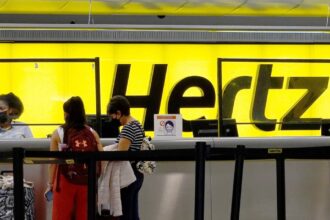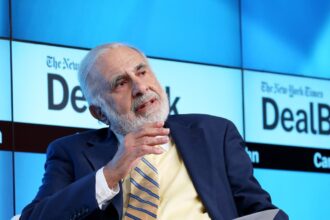The good news, Federal Reserve Chairman Jerome Powell pointed out last week, is that the U.S. economy has been more resilient than almost anyone expected so far.
Inflation has slowed quickly to around 3%. Growth is surprisingly strong—the Atlanta Fed’s GDPNow, a measure of the economy in real time, is showing a 4.9% annualized expansion in the third quarter. Data on gross domestic production, inflation, and unemployment will help color in the picture this week.
But just as night follows day, Powell’s talk of good news raises the question of what the bad news is that goes along with it. There are at least five things that threaten to make the fourth quarter messier than the year so far.
The first is higher interest rates. The Fed may have kept rates on hold last week, but it managed to jolt markets into finally believing borrowing costs are going to stay higher for quite a while. The repricing for the longer term—markets and the Fed expecting fewer rate cuts next year—is still happening and will impact the wider economy.
Second, oil prices are creeping up again. Predictions that crude will return to $100 a barrel are everywhere, and that will hit consumers.
Then there’s the restart for student loan payments. That could take $100 billion out of shoppers’ pockets starting Oct. 1.
The prospect of a government shutdown isn’t helping, either. The chaos and confusion created by such an event is likely to hit confidence if nothing else. And there’s the auto workers strike, which has now expanded.
Add it all up and it’s easy to see why Powell isn’t making a soft landing is his base case scenario. Maybe investors shouldn’t, either.
—Brian Swint
*** Join Barron’s senior writer Nicholas Jasinski today at noon when he will speak with Richard Bernstein, CEO and CIO of Richard Bernstein Advisors, a global-macro investment firm with $16 billion in assets under management. They’ll discuss the outlook for the economy, financial markets, and Federal Reserve policy, then take listener questions. Sign up here.
Try your hand at this morning’s Barron’s digital jigsaw, which is based on the week’s cover story. For all games, including the daily crossword and sudoku, click here.
***
House GOP Scrambles to Avert Looming Government Shutdown
House Speaker Kevin McCarthy was optimistic over the weekend about avoiding a government shutdown on Oct. 1, telling reporters at the Capitol there were still several days to go. But lawmakers will have to scramble this week to put together at least a temporary funding extension.
- House GOP leaders are trying to convince holdouts to get behind a handful of bills, including some that fund for the full year and one that is a short-term fix to buy time to get agreement on a full-year budget. A shutdown could furlough hundreds of thousands of workers.
- It’s unclear whether McCarthy has the votes to go forward this week. The holdouts blocked similar legislative efforts last week, and some Republican lawmakers told the Sunday morning talk shows they could not support a temporary funding measure known as a continuing resolution.
- On Tuesday, House members are expected to vote on a rule concerning four bills, one for defense spending, one to fund Homeland Security, one for the State Department and another for agriculture. Then, McCarthy will focus on a short-term funding deal.
- Transportation Secretary Pete Buttigieg told NBC on Sunday that the Biden administration’s focus is getting House Republicans to live up to a spending deal they reached with the White House earlier this year.
What’s Next: A shutdown could also delay some major economic data such as the September jobs report, and the closure of some institutions such as the Smithsonian museums in Washington, D.C., which had to close during the last shutdown in 2018-19.
—Liz Moyer
***
Hollywood Writers Reach Deal to End Strike
Hollywood writers, studios, and streamers have reached a tentative agreement to end the monthslong strike that has shut down production of TV shows and movies.
- The two sides said they have reached a deal in statements late Sunday, without giving further details. The Writers Guild of America (WGA) union said the agreement “is exceptional—with meaningful gains and protections for writers in every sector.”
- The deal is for three years and includes increased royalties for writers, minimum staffing for writers, and protections against the use of artificial intelligence, The Wall Street Journal reported.
- The breakthrough in negotiations came after five consecutive days of talks that involved the chief executives of Warner Bros. Discover, Disney, Netflix, and NBCUniversal Studios.
- In earnings reports over the past few weeks, studios said the strike had been saving them money in the short term, but that it would be damaging in the longer term when they have less content.
What’s Next: Writers will only return to work once details of the agreement have been hammered out and approved. The tentative deal for writers could pave the way for a resolution for actors as well, who started their own strike in July.
—Brian Swint
***
Biden Joining Auto Workers on Michigan Picket Line
President Joe Biden will join the United Auto Workers on their picket line Tuesday in Michigan, a show of solidarity with labor as their strike against Detroit’s Big Three auto makers continues. He announced the plan as the union expanded the strike to more facilities at
General Motors
and
Stellantis.
-
More than 5,000 employees walked off the job on Friday at 38 GM and Stellantis distribution centers. UAW President Shawn Fain said the union isn’t striking more
Ford
facilities because of progress in talks. Unifor, the Canadian auto workers, said Sunday members ratified a new Ford contract. - About six in 10 union members supported Biden in the 2020 election, the Associated Press’ Vote Cast said. The UAW hasn’t officially endorsedBiden’s re-election campaign but Fain invited Biden to join the picket line. Former President Donald Trump plans to visit Michigan on Wednesday.
- Stellantis said it offered UAW members 21.4% compounded wage hikes over five years, giving full-time hourly workers $80,000 to $96,000 annually by the end of the contract, and $1 billion more for retirees. GM called the strike expansion “unnecessary.”
- GM said that UAW’s strike escalation on top of the Wentzville assembly plant in Missouri is now affecting more than 3,000 employees, and that it has offered five proposals addressing wage increases and job security.
What’s Next: Separately, Hollywood studios and streaming companies reached a tentative agreement on a new three-year contract with the Writers Guild of America to end a 146-day strike after extending negotiations into Sunday.
—Janet H. Cho and Karishma Vanjani
***
New Covid-19 Vaccines Have Rocky Rollout. Free Tests Return.
Updated Covid-19 vaccines by
Pfizer
and
Moderna
are available, but reports of supply issues and insurance coverage hiccups point to a rocky rollout. That could be a sign demand is stronger than the pharmaceutical companies projected amid rising cases and hospitalizations.
- Moderna said in August it sees 50 million to 100 million vaccinations against Covid-19 this year, while Pfizer projected 80 million doses. About 56.5 million people received the previous booster. Moderna CEO Stéphane Bancel told Barron‘s last week he sees demand higher than 50 million.
- Shortages suggest distributors and pharmacies underestimated early demand after rolling out the shots last week. Health insurance industry organization America’s Health Insurance Plans said that insurers will cover the shots at network providers with no cost sharing.
- Moderna said additional supply is being shipped daily amid high demand. Pfizer told the Associated Press it has shipped and delivered several million doses. People can find them using the Vaccines.gov website, texting their ZIP code to 438829, or calling 1-800-232-0233.
- Because of an uptick in infections, the Biden administration is bringing back a website, Covidtests.gov, where people can order four free rapid at-home tests to be delivered to their residential address by the U.S. Postal Service. Sign-ups start today.
What’s Next: Whether the initial burst in demand lasts, or whether it represents a narrow phenomenon among those who are the most eager to update their vaccinations remains to be seen. Clarity will come in late October, when Pfizer and Moderna report their third-quarter results.
—Josh Nathan-Kazis and Janet H. Cho
***
Economic Growth and Inflation Data Due Out This Week
The week ahead includes the release of two economic reports about second-quarter gross domestic product and inflation as investors continue to evaluate the Federal Reserve’s latest message that interest rates may have to be higher for longer to cool inflation to its 2% annual target.
- The Bureau of Economic Analysis releases its third and final estimate of gross domestic product growth for the second quarter on Thursday. Analysts expect GDP to have grown at a seasonally adjusted annual rate of 2.3%, slightly more than the estimate in late August.
- The Bureau of Labor Statistics releases the personal-consumption expenditures price index for August on Friday. Analysts expect the PCE to increase 3.4% for the year, following a 3.3% gain in July. Core PCE, excluding volatile food and energy prices, is expected to rise 3.9%.
- On Friday, Fed Gov. Michelle Bowman and Boston Fed President Susan Collins both said at least one more interest rate increase could be needed after the Fed held rates steady last week at 5.25% to 5.5%, a 22-year high.
- Resilient consumer spending and low unemployment have helped drive the economy though economists are forecasting growth to slow. Goldman Sachs economists expect growth to slow to a 1.3% rate next quarter, from a 3.1% gain in the third.
What’s Next: Earnings on Tuesday from
United Natural Foods,
the primary grocery distributor for Whole Foods, are expected to give investors an idea of how wealthier shoppers are navigating higher food prices.
—Liz Moyer and Nicholas Jasinski
***
MarketWatch Wants to Hear From you.
How could a shutdown of the federal government affect the lives of everyday Americans?
A MarketWatch correspondent will answer this question soon. Meanwhile, send any questions you would like answered to [email protected].
***
—Newsletter edited by Liz Moyer, Patrick O’Donnell, Callum Keown
Read the full article here










